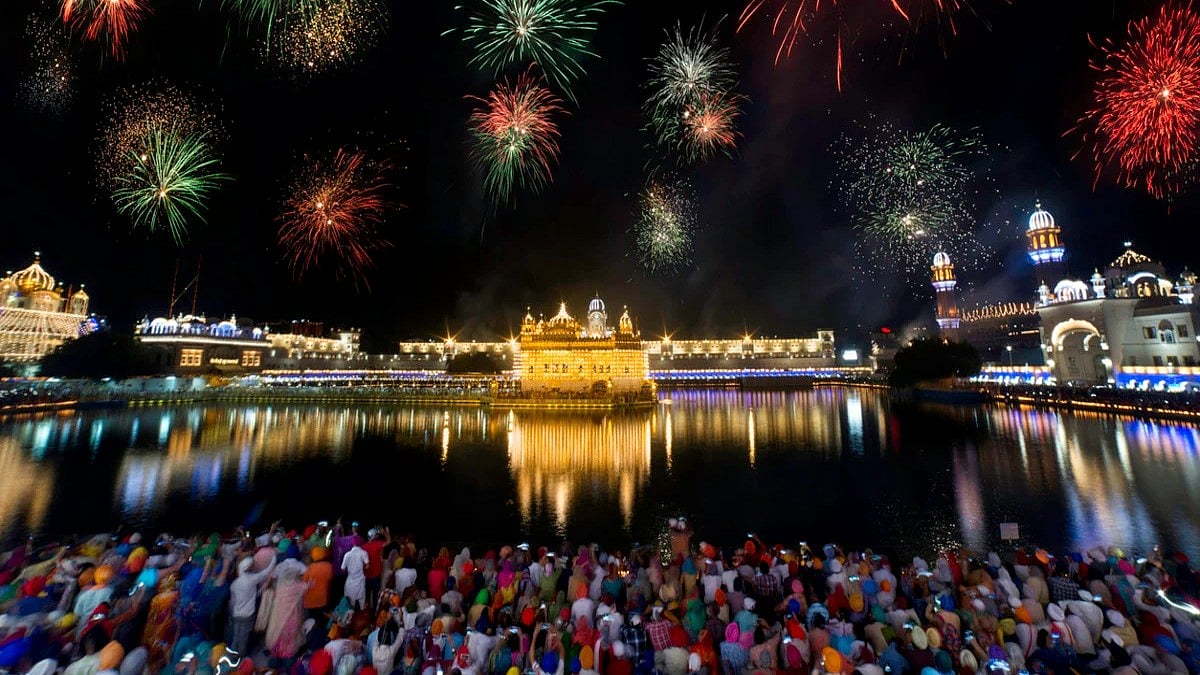
An Ode to Baba Nanak, a Guru Who Lived in Hearts, Not on Thrones
Calling him “Baba Nanak” doesn’t reduce his greatness—it brings him closer to the heart.

advertisement
People often ask, “Why do you call Guru Nanak Dev Ji ‘Baba Nanak’?”
Because our connection with him is not just of a follower to a Guru, but of a child to a loving father. He is the one who enlightened the world, laid the foundation of Sikhism, and proved that love, humility and truth are stronger than fear, power or violence. We don’t call him “Baba Nanak” out of habit—we call him that out of affection.
In most Punjabi homes, his picture—white beard, saffron robe, eyes closed in peace—felt like family. As a child, I even thought he was my own grandfather, until my nana ji said, “This is our first Guru.” That day, a bond was formed—one that led me to Japji Sahib and to the first truth of life:
The Punjab That His Footsteps Still Bind
Guru Nanak Dev Ji’s life is written across both Punjabs—Lehanda Punjab (now in Pakistan) and Charhda Punjab (in India). He was born in Nankana Sahib, preached in places like Sialkot, and spent his final years in Kartarpur Sahib—all across the border today. But his journey was equally rooted on this side—at Sultanpur Lodhi, where he worked at the Modi Khana, disappeared into the Bein river for three days, and emerged with a message that shook history:
Kartarpur and Sultanpur Lodhi are not just physical sites — they are spiritual milestones. Batala, where he was married; Gurdaspur, where he stayed on his way to the Himalayas; Amritsar and Anandpur Sahib, where his legacy expanded—all hold fragments of his presence.
Today, the Kartarpur Corridor stands as a rare bridge between two countries—not political, but emotional. A reminder that borders cannot divide the path of a man who believed in unity, not ownership.
The Traveller Who Awakened the World
Long before microphones, maps or social media, Guru Nanak Dev Ji walked across India, Tibet, Mecca, Baghdad and Sri Lanka—not to convert people, but to awaken minds.
Not commandments, but a way of life. He spoke the language of the soul—a language that needs no translation.
His teachings shaped my life. They taught me to work hard, live truthfully and help others. If I say that whatever I am today is because of him, it would not be an exaggeration.
A Voice Centuries Ahead of His Time
Guru Nanak Dev Ji didn’t speak only of God—he spoke of earth, society, equality and dignity.
He saw nature as family: “Pavan Guru, Paani Pita, Mata Dharat Mahat.” Air is the Guru, water is the father, earth is the great mother. Today the world talks of “climate change”; he called it moral responsibility.
He defended women when the world silenced them:
He warned humanity about greed long before capitalism existed: “Lobhi andha dubidha maya”—the greedy are blind, trapped in illusion. In a world obsessed with excess, he taught balance.
He rejected hate and superiority in one line: “Na ko bairi, nahi begana”—no one is my enemy, no one is a stranger. In today’s world of rising intolerance—where caste, class and religion are turned into divisions—his reminder still echoes: “Ek Pita Ekas Ke Hum Baarik”—we are all children of one Father.
Langar, Sacha Sauda and the Equality of Souls
Langar was not charity—it was a revolution. Kings and labourers, rich and poor, upper caste and lower caste—all sat on the same floor, eating the same food, served by the same hands. Today, the Golden Temple Langar feeds more than 100,000 people every single day—powered not by money, but by seva.
As a young boy, when he was given twenty rupees to start a business, he used it to feed hungry saints. He called it Sacha Sauda—The True Bargain.
Because the only profit that multiplies forever is kindness.
The Guru for Every Faith, Everywhere
Guru Nanak Dev Ji was not a Guru for one community—he was a teacher for all humanity. In Iran he is Nanak Shah Faqir, in Mecca Baba Nanak Rumi, in Tibet Nanak Lama, among Sufis, he is Peer Nanak, and among Sikhs the first Guru.
He visited temples, mosques and sang with saints of every path—showing that the Divine is beyond boundaries. His lifelong companionship with Bhai Mardana Ji was a living symbol of unity and brotherhood. Loved across India, Pakistan, Afghanistan, Tibet, Iran and beyond—he connected hearts without ever building an empire or throne.
Sarbat da Bhala—The Prayer Beyond Borders
His final message was not for one nation, one side or one faith:
May the Divine Name uplift us, and may there be welfare for all beings. He didn’t ask only for the good of “my people.” He asked for the good of everyone.
That is Baba Nanak—a Guru, a reformer, a traveller, a farmer, a poet, a saint—and above all, a father who still teaches the world not just how to find God, but how to be human.
(The author is a freelance journalist. This is an opinion piece and views expressed are the author's own.)
- Access to all paywalled content on site
- Ad-free experience across The Quint
- Early previews of our Special Projects
Published: undefined